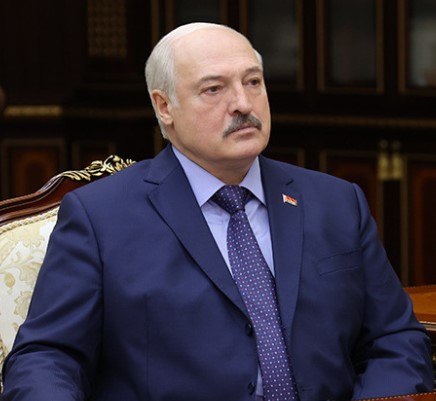Medical experts discussed in Minsk the strategy for managing the risks of developing non-communicable diseases

Photo is illustrative in nature. From open sources.
On April 15, 2025, as part of the 30th International Medical Forum "Healthcare of Belarus - 2025", the Republican Scientific and Practical Seminar "Implementation of the Harm Reduction Concept for Managing Risk Factors for the Development of Non-Communicable Diseases (Tobacco Smoking, Excessive Consumption of ALCOHOL, SALT and SUGAR), as well as Ecology in Public HEALTH Issues in Belarus" was held in MINSK. The event was organized by the Ministry of Health of the Republic of Belarus , the State Institution "Republican Scientific and Practical Center for Medical Technologies, Informatization, Management and Economics of Healthcare" and the Republican Union of Industrialists and Entrepreneurs. One of the most serious global challenges of recent years is chronic non-communicable diseases (NCDs), such as diseases of the circulatory system, diabetes mellitus, malignant neoplasms, chronic respiratory diseases and others. The development of NCDs is based on risk factors - potentially hazardous health factors of a behavioral, genetic, environmental, social nature, which increase the likelihood of developing diseases, their progression and unfavorable outcome. Among the main modifiable (i.e. changeable) risk factors are smoking, alcohol abuse, salt and sugar. High human and economic costs emphasize the need to reduce the burden of NCDs in Belarus as well. Among all the known and already widely used modern approaches to the policy of influencing risk factors in many developed countries of the world, the concept of harm reduction occupies a special position: this concept allows moving from prohibitive approaches and methods to scientifically proven and working methods of changing the behavior of both an individual and the whole society. The
seminar program included reports by leading specialists in the field of hygiene and child health, mental health, pulmonology and phthisiology: issues of smoking and alcohol abuse, the formation of anti-alcohol policy in the country, and achievements of neuroendocrinology were touched upon. The seminar was attended by Aleksandrov A. A., Chief Physician of the Healthcare Institution "Minsk Regional Clinical Center "Psychiatry - Narcology", PhD, Associate Professor, Guzik E. O., Professor of the Department of Hygiene and Children's Health with a Course for Advanced Training and Retraining of the Educational Institution "BSMU", MD, Professor, Danilova L. I., HEAD of the Department of Clinical Endocrinology of the Institute for Advanced Training of Physicians and Retraining of Healthcare Personnel of the Educational Institution "BSMU", MD, Professor, Kaminskaya Yu. M., DIRECTORState Institution "Republican Scientific and Practical Center for Mental Health", PhD, Associate Professor, Roshchupkin A. V., Chairman of the Supervisory Board of the Association of European Businesses, First Deputy Director of the Unitary Enterprise "Coca-Cola Beverages Belarus", PhD, Associate Professor, Ruzanov D. Yu., Deputy Director for Research, State Institution "Republican Scientific and Practical Center for Pulmonology and Phthisiology", Professor of the Department of Cardiology and Internal Diseases, UO "BSMU", PhD, Associate Professor.
Hygienists, pulmonologists, pediatricians, psychiatrists, narcologists, allergists-immunologists, students of medical educational institutions engaged in training, advanced training and (or) retraining, specialists with higher medical education, young scientists , and postgraduate students were invited to participate in the seminar.
Dmitry Yuryevich Ruzanov, Deputy Director for Research at the Republican Scientific and Practical Center for Pulmonology and Phthisiology, commented: "A healthcare professional's conversation with a smoking patient should be based on motivational counseling - it is necessary to emphasize that quitting smoking will improve their well-being and allow them to live longer. Experience shows that the directive system practically does not work for patients with severe tobacco addiction. That is why it is important that such patients could also potentially consider various alternatives for themselves that involve modification, that is, reducing risks to the body."
Alexey Alekseevich Aleksandrov, Chief Physician at the Minsk Regional Clinical Center for Psychiatry and Narcology, noted: "Currently, an approach aimed at reducing harm - when instead of a total ban or restrictions, a strategy of gradually changing dangerous behavior to less harmful is used - is a public health trend in many developed countries. It is absolutely clear that such an approach must be comprehensive and apply not only to tobacco smoking, but also to other key modifiable risk factors - primarily, excessive alcohol consumption."
seminar program included reports by leading specialists in the field of hygiene and child health, mental health, pulmonology and phthisiology: issues of smoking and alcohol abuse, the formation of anti-alcohol policy in the country, and achievements of neuroendocrinology were touched upon. The seminar was attended by Aleksandrov A. A., Chief Physician of the Healthcare Institution "Minsk Regional Clinical Center "Psychiatry - Narcology", PhD, Associate Professor, Guzik E. O., Professor of the Department of Hygiene and Children's Health with a Course for Advanced Training and Retraining of the Educational Institution "BSMU", MD, Professor, Danilova L. I., HEAD of the Department of Clinical Endocrinology of the Institute for Advanced Training of Physicians and Retraining of Healthcare Personnel of the Educational Institution "BSMU", MD, Professor, Kaminskaya Yu. M., DIRECTORState Institution "Republican Scientific and Practical Center for Mental Health", PhD, Associate Professor, Roshchupkin A. V., Chairman of the Supervisory Board of the Association of European Businesses, First Deputy Director of the Unitary Enterprise "Coca-Cola Beverages Belarus", PhD, Associate Professor, Ruzanov D. Yu., Deputy Director for Research, State Institution "Republican Scientific and Practical Center for Pulmonology and Phthisiology", Professor of the Department of Cardiology and Internal Diseases, UO "BSMU", PhD, Associate Professor.
Hygienists, pulmonologists, pediatricians, psychiatrists, narcologists, allergists-immunologists, students of medical educational institutions engaged in training, advanced training and (or) retraining, specialists with higher medical education, young scientists , and postgraduate students were invited to participate in the seminar.
Dmitry Yuryevich Ruzanov, Deputy Director for Research at the Republican Scientific and Practical Center for Pulmonology and Phthisiology, commented: "A healthcare professional's conversation with a smoking patient should be based on motivational counseling - it is necessary to emphasize that quitting smoking will improve their well-being and allow them to live longer. Experience shows that the directive system practically does not work for patients with severe tobacco addiction. That is why it is important that such patients could also potentially consider various alternatives for themselves that involve modification, that is, reducing risks to the body."
Alexey Alekseevich Aleksandrov, Chief Physician at the Minsk Regional Clinical Center for Psychiatry and Narcology, noted: "Currently, an approach aimed at reducing harm - when instead of a total ban or restrictions, a strategy of gradually changing dangerous behavior to less harmful is used - is a public health trend in many developed countries. It is absolutely clear that such an approach must be comprehensive and apply not only to tobacco smoking, but also to other key modifiable risk factors - primarily, excessive alcohol consumption."
Read together with it:
- С начала года Московская область увеличила экспорт свинины на 35% в стоимостном выраженииМосковская область продолжает укреплять позиции одного из ведущих экспортеров продукции агропромышленного комплекса в России. По итогам 9 месяцев с начала года регион нарастил экспорт свинины на 35% по стоимости. В натуральном выражении объем поставок составил 85 тысяч тонн, что на 17% больше, чем за аналогичный период прошлого года. В Министерстве сельского хозяйства и продовольствия Московской о...
- Матричные РНК-вакцины от COVID продлили жизнь тяжелых раковых больныхМатричные РНК-вакцины против коронавируса продлили жизнь пациентам, больным раком в самой тяжелой, четвертой стадии, сообщает The Washington Post. К такому выводу пришли исследователи Онкологического центра имени М. Д. Андерсона Техасского университета и Университета Флориды. «Эти данные невероятно интересны, но они должны быть подтверждены в ходе третьего этапа клинических испытаний», — заявил од...
- Совместные проекты и обмен опытом. В каких направлениях Беларусь и Казахстан готовы развивать сотрудничество в АПК23 октября, Минск. Беларусь готова делиться с Казахстаном опытом в аграрной сфере и заинтересована в дальнейшем расширении партнерства. Об этом заявил первый заместитель премьер-министра Беларуси Николай Снопков на первом Белорусско-казахстанском аграрном форуме, который прошел в Астане, сообщает БЕЛТА со ссылкой на пресс-службу правительства. "Беларусь действительно обладает значительным опытом, ...
- Беларусь и Алтайский край намерены увеличить биржевую торговлю сельхозпродукцией23 октября, Минск. Поставки белорусской мясомолочной продукции в Алтайский край и закупки зерна и семян для аграрного сектора Беларуси определены в качестве магистральных направлений сотрудничества в сфере электронной биржевой торговли. Такая договоренность достигнута по результатам встречи представителей Белорусской универсальной товарной биржи с делегацией деловых кругов Алтайского края, которая...
- Modernization of poultry farming in the Nizhny Novgorod region: new opportunities and production growthThe project, implemented under the regional preferential lending program, allowed the Russkoye Pole agricultural holding to invest 440 million rubles. Regional Agriculture Minister Nikolai Denisov reported that the organized sector produced 88,400 tons of poultry MEAT in 2024 , with an expected increase to 93,8......
- Proper insemination of cows: how genetic and physiological factors influence herd productivityGenetics plays a significant role in determining the reproductive fitness of bulls, and daughter pregnancy rates should be compared to accepted standards. If a farm's performance falls short of the baseline, using less-than-optimal bulls can still improve fertility. Cow physiology is also crucial for successful insemination. Feed quality, housing conditions, and veterinary care directly impact res...
- The EU imposed sanctions against Medvedev's aide and the HSE rector.The sanctions include AvtoVAZ CEO Maxim Sokolov, Medvedev aide Oleg Osipov, HSE Rector Nikita Anisimov, three children's ombudsmen, a North Korean general, and others. In total, the EU has added 21 individuals to the sanctions list .As part of its latest sanctions package, the European Union imposed restrictive measures against individuals, including AvtoVAZ CEO Maxim Sokolov, Assistant to Deputy ...
- Jobs, Musk, Bezos: How Business Gurus Make Meetings Less ExhaustingSteve Jobs once refused to attend a meeting with the US President because the attendee list was too long. Anna Yoshitsugu, Senior Strategy and Development Manager at Uber, explains how business gurus prevent meetings from "stealing" their time.Let's say you hold one meeting each week, it lasts two hours, and there are ten people in attendance, each with an average salary of 1......
- Moscow Region increased pork exports by 35% in nine monthsThe Moscow Region ranks first in pork exports by value, with CHINA , Vietnam , Belarus , Kazakhstan , and Armenia among its main foreign partners. The region has significantly improved its position, rising from fourth to third among Russian regions in agricultural and food EXPORT value. The Moscow Region is also actively developing its processing industry, which is contributing to economic growth ...




























































